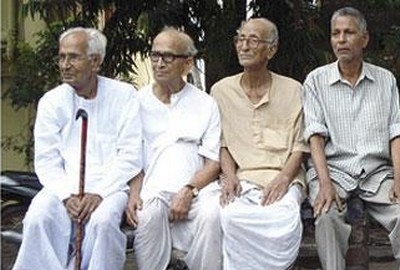#WorldSeniorCitizen'sDay: Need to remove the tag of 'unproductive population'
Total Views |
New Delhi, August 21: In economics, the pollution below the age of 15 and above the age of 60 is called as ‘unproductive population’. Too much burden of unproductive population is considered as a stress on the economy. Economics, as a science, can think in such emotionless manner, but, isn’t it derogatory to term the senior citizens as ‘unproductive population…?’. Whatever the science says, human values should always remain at the top. World Senior Citizen’s Day today remembers us our belongingness to the elderly people.

India is considered to be the ‘youngest country’ in the world with maximum young, productive population. However, India also has a significant and increasing number of elderly population. According to the State of World Population 2019 report by the UN, six per cent of India's population is of the age of 65 and above (of the total population of 1.36 billion). 71% of elderly population resides in rural areas while 29 % is in urban areas. Kerala has maximum proportion of elderly people in its population (12.6 per cent). Share of older persons, those aged 60 years or above, in India's population is projected to increase to nearly 20 per cent in 2050 (UN).

The need to formulate policies and programmes for older persons was acknowledged throughout the world in the 1980s after the United Nations First World Assembly on Ageing. At that time, developed countries were already experiencing and reacting to rapid population ageing, while developing countries, including India, were still battling with issues related to high population growth rates, such as infant and maternal mortality. Now, developing countries are beginning to deal with the challenges of population ageing and its impact on societal functioning. The Government of India started addressing the challenges of a growing number of older persons in the 1990s and adopted the National Policy on Older Persons (NPOP) in 1999. Thereafter, the Maintenance and Welfare of Parents and Senior Citizens Act in 2007 defined the responsibilities of the family and the State in providing care for older persons.

While policies and the law provided the framework, the most visible intervention in old age care was the launching of the National Programme for Health Care of the Elderly (NPHCE) in 2011. Prior to these interventions, an old age pension was available in different States though its provisions and the benefits were not uniform. Despite having a historical tradition of an old age pension, the long-felt need for a universal pension in India has yet to be accomplished.

Making the life of senior citizens happy ultimately depends on the treatment by young-ones. ‘Matrudevo Bhav’, ‘Pitrudevo bhav’ is the doctrine of Indian culture. Do we really live with this doctrine? Clashes between two generations is quite obvious due to generation gap. But a sense of understanding is more expected from the side of young persons. Old people don’t have any expectation of money or property, but they just want care by their children. Hence, World Senior Citizen’s Day is actually for the young population to keep them remembered that young ones are also going to be old on some day!